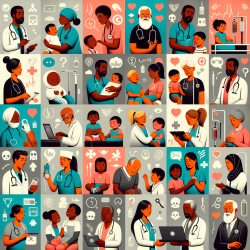The role of caregivers for children with medical complexity (CMC) is both challenging and crucial. These caregivers often face significant psychosocial risks due to the demanding nature of their responsibilities. Recent research, such as the study titled "Screening for caregiver psychosocial risk in children with medical complexity: a cross-sectional study," provides valuable insights into these challenges and offers guidance for healthcare practitioners to better support these families.
The Importance of Screening for Psychosocial Risk
The study conducted at The Hospital for Sick Children in Toronto utilized the Psychosocial Assessment Tool (PAT) to quantify the psychosocial risk among family caregivers of CMC. The findings revealed that caregivers of CMC report some of the highest levels of psychosocial risk compared to other pediatric populations. This highlights the need for systematic screening and early intervention to ensure appropriate support and resource allocation.
Key Findings from the Research
- The mean PAT score among caregivers was 1.17, indicating an intermediate level of risk.
- 45% of caregivers were classified as low-risk (Universal), 44% as intermediate-risk (Targeted), and 11% as high-risk (Clinical).
- No specific sociodemographic factors were found to be significant predictors of total PAT scores.
Implications for Healthcare Practitioners
For healthcare practitioners, understanding these findings is crucial in developing effective strategies to support caregivers. Here are some ways practitioners can implement these insights:
- Implement Regular Screening: Use tools like the PAT during clinic visits to identify caregivers at risk and provide timely interventions.
- Develop Support Networks: Facilitate connections between caregivers to share experiences and resources, reducing feelings of isolation.
- Provide Tailored Interventions: Recognize that each caregiver's situation is unique and requires personalized support plans.
- Advocate for Resources: Work with healthcare systems to ensure adequate financial and social resources are available for high-risk families.
Encouraging Further Research
This study underscores the importance of further research into caregiver psychosocial risk, particularly in diverse settings. Practitioners are encouraged to participate in or initiate studies that explore different aspects of caregiver stress and resilience. By expanding our understanding, we can develop more comprehensive care models that address both medical and psychosocial needs.
Conclusion
The insights from this research provide a foundation for enhancing the support provided to family caregivers of CMC. By integrating systematic screening and tailored interventions into practice, healthcare professionals can significantly improve the quality of life for both caregivers and their children.
To read the original research paper, please follow this link: Screening for caregiver psychosocial risk in children with medical complexity: a cross-sectional study.










